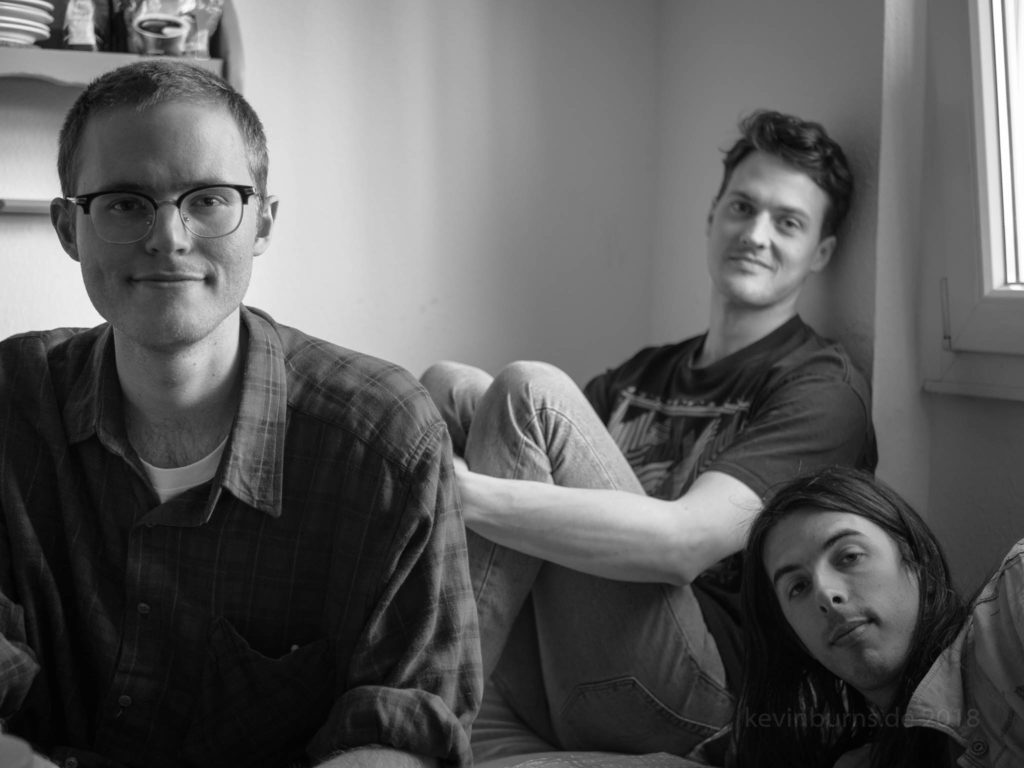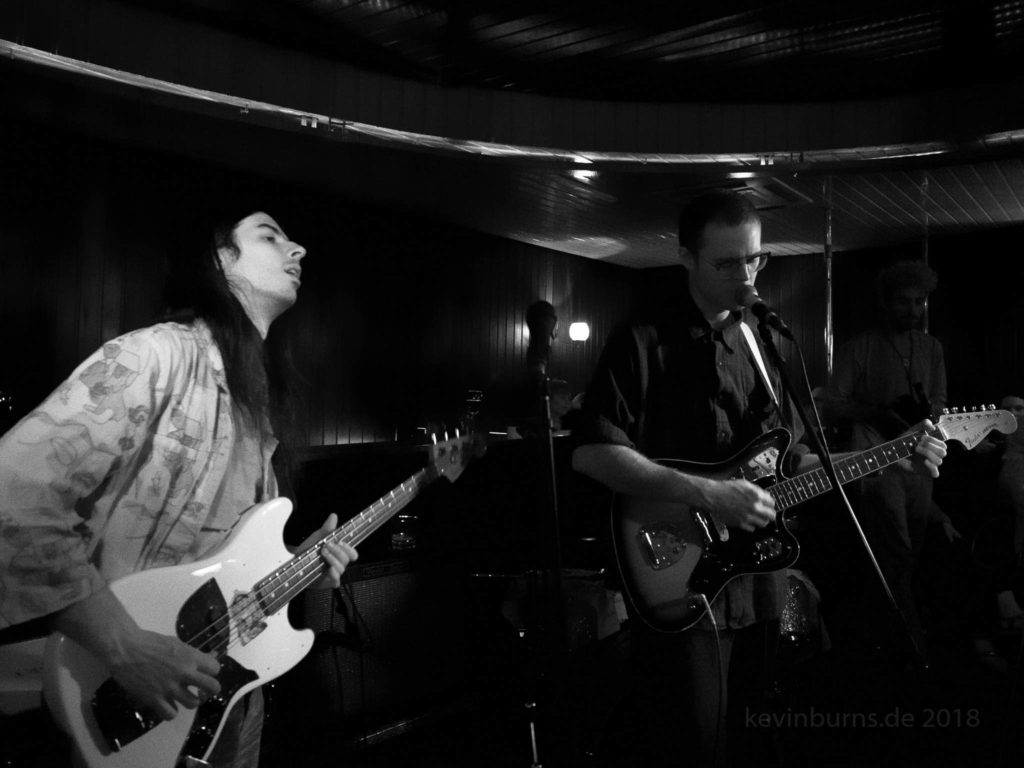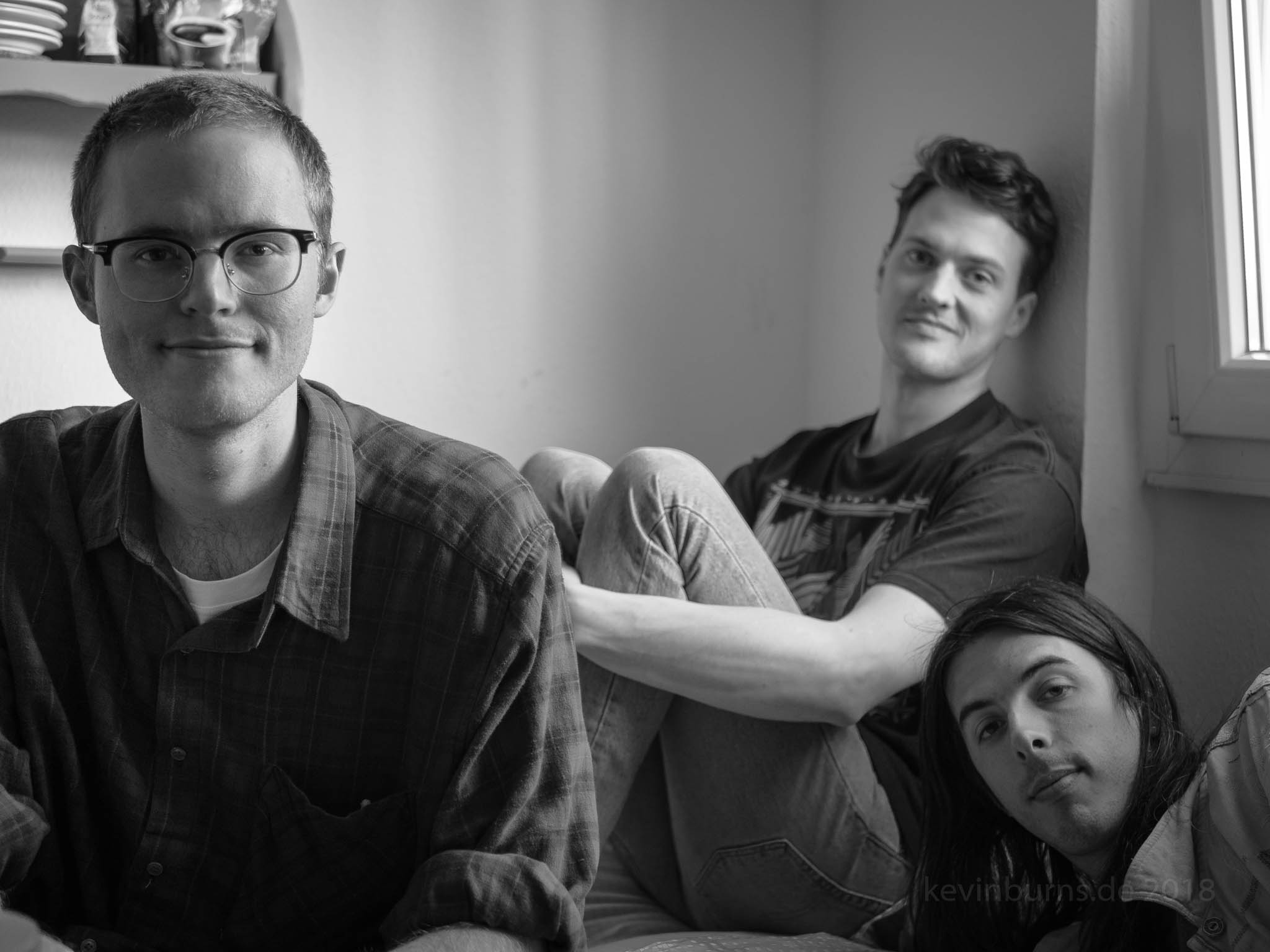Nap Eyes, one of Canada’s finest – an interview, on the occasion of the band being on tour in Europe and the UK and presenting their latest album “‘I’m Bad Now” (You’ve Changed, Paradise Of Bachelors, Jagjaguwar) to the eager audience.

Because as much as you can sit at home and delve into the lyrics of wordsmith Nigel Chapman, an abundance of introspective, reflective, self-deprecating, funny and elegant and simply informative lines and a few on the big picture…As much as you can admire the music that is added to those lyrics by guitarist Brad Loughead, bassist Josh Salter and drummer Seamus Dalton – music that appears so light and easy-going at first and still is peppered with unexpected turns in gear and atmosphere…No, you want to see them live. You still can in the UK, supported by the fantastic Haley Heynderickx who unfortunately did not come with them to mainland Europe.
Also missing was Brad Loughead. Sad but then again, it gives everyone a chance to witness Cian Nugent doing his magic on a guitar, seemingly effortlessly. On the 5th of May, on a lovely summerish evening, Nap Eyes drew quite a crowd to Cologne’s King Georg and kindly gave Offbeat Music Blog some time for a chat.

So here we go:
Offbeat Music Blog: Your three albums including the latest “I’m Bad Now” are often seen as a trilogy. Would that be a conceptual trilogy or more in the way that there is a continuity in the three albums?
Nigel Chapman: Yeah, I would say, more of the second. We did not probably do anything consciously differently or similarly. The songs just evolved as they did in our playing together but that being said, maybe the fact that we did not make a deliberate big change means all three (albums) fit together. And there is some connection. We did know what we were doing.
Seamus Dalton: And artwise they are thematically similar which was on purpose, to keep some sort of theme going through all of them.
OMB: How would you describe your own development?
Nigel: For me, just continuing with songwriting. Musically, I think, we have gotten better. I feel I have got more practised at singing. It was two years ago that we recorded this record almost now (July 2016). But gaining some skills and experience in singing, still with lots of mistakes but, you know, getting there (laughs). Lyrically, it was mostly from a different time. Sometimes it felt a little less imagistic, less imagery. For me it felt more like direct explanations of things that were going on in my mind. But I can’t really say. That may be just be me talking now. Maybe it is easier for someone else to say how it is the same or different.
OMB: I think the first album “Whine Of The Mystic” was almost a little rougher (*“uh-huh” go Nigel, Seamus and Josh in unison) *and had a live feel to it and the second album (“Thought Rock Fish Scale”) sounded like it was done in a smaller room (‘absolutely”, “definitely”) and on the third one, you can hear, ah, this is a big recording studio. Was it tempting to not just going in there and play the songs if you have all the possibilities to fiddle around with the music? Is it hard to say, okay, we are stopping at this point and leave a song like it is?
Seamus: It is, and I think we have tried some new things in the studio that we have not tried before. You can carried away very easily and lose what you set out to do in the first place with all the toys lying around.
Nigel: It was good that we did not have that much money. So we did not spend that long in there.
OMB: Much has been made of the alleged contrast between you, Nigel, being a scientist and a musician. Do you notice ways each field would influence the other?
Nigel: Yeah, definitely. Especially for me the way I approach music or songwriting is very much a part of or results from the kinds of thoughts that I am thinking. If I spend some time concentrating on a particular research area or subject, then as a result my writing will take on some elements from that field. You will hear, I am talking about it sometime what it is like doing research. But equally often or in a different way, you could say that the constant perseverance and repetition that you do in science and a lot of failure – you have to get comfortable with things not working out the right way the first time. This has given me some very valuable lessons in life and in approaching music. It has given me more patience which I think is not something I am naturally imbued with. What Jim (Elkington) had said about practice (good playing has got little to do with talent, just practice), that’s similar. I felt that way as well. Just having more time to repeat and practise. You should be comfortable with taking it slow. Because things do take way longer than you would hope in all kinds of ways, including our career or how long it takes for an album to be released or finalised. But if you get patient, this won’t be as painful an experience. You don’t mind waiting as much and figure out things to occupy you with while you wait.
OMB: Maybe also, if you don’t burden yourself with a failure but accept something has to be, say, repeated, that is a relief?
Nigel: So true, yeah. Because it does not really do much good. If it does not work, it does not do good to have a huge amount of negativity towards yourself. It does not really serve any purpose.
OMB: You made music your profession now. Does that pose any problems, to know, this is it, that is my source of income.
Nigel: There are probably challenges and problems in any career. Since we have to earn our rent and our food in this way, it is stressful in a different way than it used to be. We are putting a lot of personal investment in terms of time and energy into this. We hope that it works out. Sometimes it is scarier than before when it could be more casual. But overall it is a satisfying and fulfilling thing. I feel really happy about that and lucky and optimistic.
OMB: So you rather see the benefits of it than feel like it casts a shadow over something that you like to do?
Nigel: Yeah, I think so.
Seamus: I don’t know what else we would do, probably. (Laughs).
Nigel: It feels natural. It is the kind of work we like to do and we felt drawn to and somehow ended up continuing.

OMB: You live far apart in Canada, Nigel in Nova Scotia, the rest in Montreal. Some people argue it is impossible to work together like that. Nigel, you have done a project where a song was passed along via email or the like and is this the way you work too? Nigel starts a song and then it gets passed on and worked on before you even meet up?
Seamus: Exactly.
Josh: Sometimes we hear demos. But usually we don’t really do much before. Nigel writes the song. When we get together, we play it till it is the song.
Nigel: I don’t know how it will sound when they bring their elements to it. But as Josh is saying, we usually just jam. Sometimes it takes a while for parts to start to mesh together like in a puzzle. But then they do, or sort of (laughs). And then we have a result. It is a very rewarding and exciting experience, sometimes very frustrating but mostly really satisfying and fun.
OMB: You must know each other really well to write the lyrics, Nigel, a basic melody perhaps and have a certain atmosphere in mind and then trust the others to transfer this to music. Is there sometimes a misconception of what you had in mind?
Nigel: Not so much. I think. Maybe once in a while, my mind will be like: Oh, I thought it’s like this and that. Usually I just let go as much as I can. That’s easier for me. For me it works to let everybody else do things. I think if I had more ideas of what all the parts should be, then I would come into conflict more often with the others. Usually I just do my thing and let everybody else build around it. So in this way it works really well. The others have a good collaborative spirit and maybe more or different kinds of social skills than me. They figure out things together so we get a result.
OMB: Also, the audience might project something else on the song. Or even the songs, since they were recorded almost two years ago, have during the performances taken on a different meaning for you?
Nigel: That’s very true. That is certainly a thing that happens. It evolves when we play together. Certainly for me when I sing the same lyrics now because I am different than I was back then. That’s the nice thing about music, too, because you can constantly reinterpret yourself and you are bringing the past to life each time when you bring an old song into the present. Sometimes you go like, why am I playing this all the time? You feel constrained about it. But that is also a good thing. It does not always feel good but it is a good discipline to do what you have to do, the best you can, any time. At a concert, we have to play our old songs. That’s what we are paid to do.
OMB: Nigel, you are said to be quite introverted. So you work alone, as a scientist, as the songwriter and then you thrown into the thick of it, get shoved out on tour.
Nigel: At first – sorry, guys, that I am answering all of this. At first it took a period of adaption for me because I did not know what to do. But there are a few things that make it a lot easier and one is having got used to it and knowing what to expect. The rhythm of the day, when you can be in your own mind even when you are around the others. There are certain times of the day that are more suitable for not being as talkative but being quiet in yourself and recharge a bit. Knowing how to take advantage of that time is helpful. But also, gaining a bit of social skills and capability for extraversion over time, strengthening the weak side of your personality is always good. But also playing with my friends, with Seamus, Josh and Brad…Cian is actually with us, so also Cian. Travelling with your friends makes a huge difference just in terms of relating to people because I know I have people who understand me. They know my patterns of feeling different ways. I feel accepted and that helps a lot. It is like a translator with others.
OMB: Lyrically, again, is that all you in the songs Nigel or different persons or personas?
Nigel: Different personas, I guess. Mostly it sounds like the same persona. Different sides of my personality or characters that seem to exist in my psyche. Which I think everyone has. You have got different people that act. Josh was talking about this one this morning. “The White Disciple” is the kind of person within the psyche. Some are good and bad. Some qualities that are good in certain situations, some are bad on others. You try not to judge them. You give them room to exist. You should have somebody who is able to keep them in check. There is like a really anti-social character. At times I give him a pretty long leash so he can roam around but at other times restrain him in so he does not interfere with harmony in the world. This idea is helpful for me, you know.
OMB: What’s new on the album is that you might not have an answer to all the questions that you start asking after having a good introspective look and also at the outside world, but there seems to be a silver lining. Also I think it is beautifully transferred to the music which turns adequately. Reminds me of The Go-Betweens. Did anybody ever say that?
Nigel, Josh and Seamus: YES!
Seamus: Not a band that anyone of us would cite as an influence.
Nigel: It’s only because I have not really listened to them that much. They are probably very good but I have not heard of them so much.
Seamus: A friend of mine gave me an album of The Go-Betweens a long time ago and I did see the similarity. They are a very good band. It is a compliment.
OMB: Not a bad thing at all! Thank you very much for your time!
